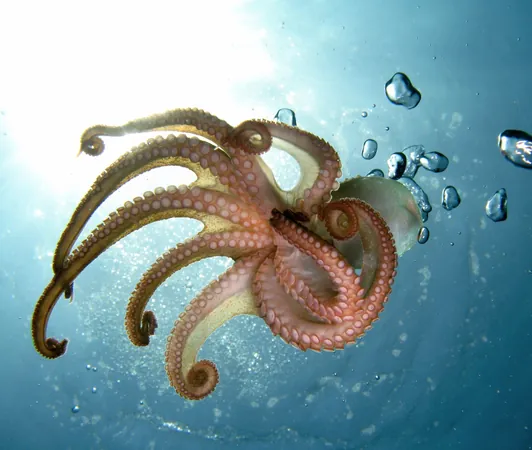
Octopuses and Squids: The Speed Demons of Evolution
2025-06-06
Author: Sarah
A Rapid Revolution in Evolution
When we think of evolution, we often picture a slow, steady march of change. But for octopuses and squids, evolution has taken a wild and rapid turn. New research reveals that most of the evolutionary changes these oceanic marvels have undergone occurred in explosive bursts over the past 500 million years.
New Findings from the University of Auckland
Researchers at the University of Auckland have ignited a fresh debate with their groundbreaking study of cephalopods—creatures that include not just octopuses and squids, but also cuttlefish and the mysterious vampire squids. By adopting a novel probabilistic model and utilizing advanced software, the team has brought to light the concept of 'punctuated equilibrium,' a theory suggesting that evolution is more about sudden jumps than a gradual process.
Understanding 'Punctuated Equilibrium'
First introduced by paleontologists Stephen Jay Gould and Niles Eldredge in the 1970s, punctuated equilibrium posits that the appearance of new species often happens amidst long stretches of stasis. The Auckland team applied this theory to the evolution of cephalopods and discovered that gradual changes played only a minor role in their evolutionary story.
Saltative Branching: The Evolutionary Leap
In their study, the researchers not only traced the evolutionary traits of squids and octopuses but also examined Indo-European languages and ancient enzymes, all exhibiting rapid changes at pivotal historical moments. They termed this phenomenon 'saltative branching,' illuminating a shift in how scientists perceive evolutionary processes.
Why This Matters More Than Ever
As Niles Eldredge expressed, this research may serve as a crucial pivot toward broader acceptance of the punctuated equilibrium theory, which has sparked debate across various fields, from biology to human history. With advanced mathematical techniques underscoring the observed rapid changes, the study raises significant questions about how life adapts in the face of sudden environmental shifts, genetic changes, or even sheer chance.
The Implications for Our World Today
What does this mean for science and our understanding of evolution? It challenges the long-held view that evolution is a steady climb and suggests a more chaotic landscape filled with quick adaptations. This insight can help scientists better understand how species might tackle current environmental challenges, such as climate change and habitat destruction.
A New Era of Evolutionary Study
The results of this study, published in the journal Proceedings of the Royal Society B Biological Sciences, significantly deepen our understanding of evolution, revealing nature's remarkable ability to adapt swiftly in the right circumstances. As we look to the future, the rapid evolution of octopuses and squids serves as a vital reminder of life’s relentless drive to adapt and survive, even in tumultuous times.




 Brasil (PT)
Brasil (PT)
 Canada (EN)
Canada (EN)
 Chile (ES)
Chile (ES)
 Česko (CS)
Česko (CS)
 대한민국 (KO)
대한민국 (KO)
 España (ES)
España (ES)
 France (FR)
France (FR)
 Hong Kong (EN)
Hong Kong (EN)
 Italia (IT)
Italia (IT)
 日本 (JA)
日本 (JA)
 Magyarország (HU)
Magyarország (HU)
 Norge (NO)
Norge (NO)
 Polska (PL)
Polska (PL)
 Schweiz (DE)
Schweiz (DE)
 Singapore (EN)
Singapore (EN)
 Sverige (SV)
Sverige (SV)
 Suomi (FI)
Suomi (FI)
 Türkiye (TR)
Türkiye (TR)
 الإمارات العربية المتحدة (AR)
الإمارات العربية المتحدة (AR)